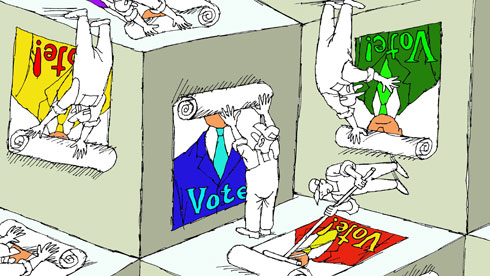This is not the first time that the legitimacy of political parties is in question. History is rife with examples of rejections of this kind. In 1919, Benito Mussolini could fight it all he liked, he would still end up founding a political party. In the long run, parties remain the only tool that truly allows the exercise of power.
In recent years, historical parallels have become inapplicable because we find ourselves in a new, technology-based reality. Massive, world-wide access to the internet by a huge number of people and the emergence of social networks. The conclusions of political experts who studied the influence of internet and social networks on the Arab Spring come to mind. In just a few months, the face of a whole region of the world was transformed. There are other examples such as Occupy Wall Street in the US and the protests in Turkey of the last two months, among others.
These new forms of political discussion on social networks take us far from well-known, traditional forums. Let us try to imagine how many young people on social networks would prefer to go to a political rally rather than holding an informal discussion on Facebook. This is what makes the image of the party archaic as a model of political organisation.
The parties, for their part, eye the new discussion forums with more fear than hope. The jousting of political ideas is not dead but it is in transition. It seems that the parties themselves do not sufficiently attract those resources which generate ideas "at the grassroots level". They are very far behind in their awareness of the new reality.
Alienating the population
Mistrust of political parties, their increasingly evident alienation from the population's agenda, as well as the new forms of political discussion all combine to place those that traditionally mediate between the authorities and the people in a sensitive spot. It is not fortuitous that this lack of legitimacy results in new models that allow citizens to apply pressure. They have different names depending on their country of origin: they are the Indignados in Spain; Occupy Wall Street in the US; or the opposition to the system in Russia. What they have in common, however, is their horizontal structure, their use of social networks and their stance against the status quo – as well as their desire to change the system, whatever that means.
The good news is that Bulgaria is not lagging behind the rest of the world. The dissent that has manifested itself for more than a year gave birth to these types of organisations. A comparison of their scale and reach is unfavourable to us but we have taken our first steps in this direction. In recent months, many groups were founded on Facebook that are now turning into genuine political discussion groups. There is also the "protest network" created by an activist.
Falling prey to illusions
Discussions limited to the internet, however, carry some genuine risks. The most serious of which is falling prey to illusions. The opinions expressed in online forums are far from representative of society as a whole. By staying confined to a closed social circle and to an encouraging environment, it is easy to start believing that everyone holds the same opinions and values. Far from it. It is only a small part of the population that found a way to get its ideas accepted while seeking to validate them.
To really change anything in this country and to exercise power, the support of a majority of citizens is necessary. A legislative tool for participating in elections is then required to prove that this concerns not just a few thousand people on internet but a majority of Bulgarians. For the time being, however, there is but one way to do this within the legislative framework: create a party and run candidates in elections.
If one of the newly created movements grows and gains in popularity, it will result in the creation of a party with candidates in the legislative elections. If it fails, it will be buried in the cemetery of politics along with many others that came before it. For this reason, the leaders of the new political organisations would do well to not rush to condemn parties. If their movements achieve their goals, they too will have recourse to these tried and true organisations that are political parties.
Demonstrations in Bulgaria
Like a perfume from 1989
After five months of almost uninterrupted street protests, Bulgarian society is passing through a crisis of confidence in their politicians that is without precedent, writes journalist Ilia Valkov in the daily Sega. This loss of trust signals the degradation of society and the state, calling into disrepute as it does the legitimacy and the authority of the political class, and of the power of the judiciary, media, NGOs and the Orthodox Church.
Behind this loss of trust lies an erosion of values. The voters are seeking salvation through miraculous elections and beautiful promises from charismatic leaders – which is what gives the political "Messiah” his confidence.
A parallel can thus be drawn between the situation today and the events of 1989, which led to the fall of the Iron Curtain –
Bulgarian society has begun to seethe. The “beleaguered citizenry” has begun to take stock of itself, to organise itself, and to proceed to self-criticism – and earn some self-esteem.
Was this article useful? If so we are delighted!
It is freely available because we believe that the right to free and independent information is essential for democracy. But this right is not guaranteed forever, and independence comes at a cost. We need your support in order to continue publishing independent, multilingual news for all Europeans.
Discover our subscription offers and their exclusive benefits and become a member of our community now!












